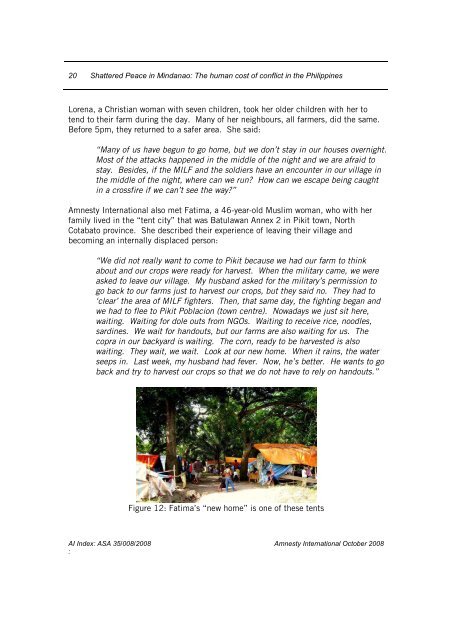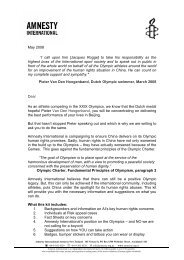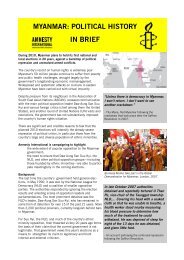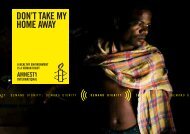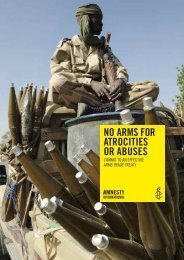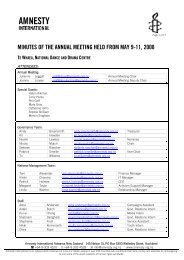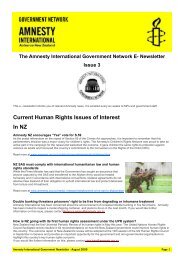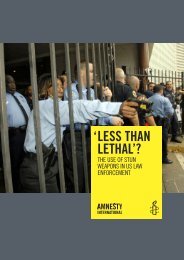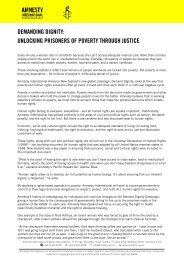Shattered Peace in Mindanao: the human cost of conflict in the ...
Shattered Peace in Mindanao: the human cost of conflict in the ...
Shattered Peace in Mindanao: the human cost of conflict in the ...
You also want an ePaper? Increase the reach of your titles
YUMPU automatically turns print PDFs into web optimized ePapers that Google loves.
20 <strong>Shattered</strong> <strong>Peace</strong> <strong>in</strong> M<strong>in</strong>danao: The <strong>human</strong> <strong>cost</strong> <strong>of</strong> <strong>conflict</strong> <strong>in</strong> <strong>the</strong> Philipp<strong>in</strong>esLorena, a Christian woman with seven children, took her older children with her totend to <strong>the</strong>ir farm dur<strong>in</strong>g <strong>the</strong> day. Many <strong>of</strong> her neighbours, all farmers, did <strong>the</strong> same.Before 5pm, <strong>the</strong>y returned to a safer area. She said:“Many <strong>of</strong> us have begun to go home, but we don’t stay <strong>in</strong> our houses overnight.Most <strong>of</strong> <strong>the</strong> attacks happened <strong>in</strong> <strong>the</strong> middle <strong>of</strong> <strong>the</strong> night and we are afraid tostay. Besides, if <strong>the</strong> MILF and <strong>the</strong> soldiers have an encounter <strong>in</strong> our village <strong>in</strong><strong>the</strong> middle <strong>of</strong> <strong>the</strong> night, where can we run? How can we escape be<strong>in</strong>g caught<strong>in</strong> a crossfire if we can’t see <strong>the</strong> way?”Amnesty International also met Fatima, a 46-year-old Muslim woman, who with herfamily lived <strong>in</strong> <strong>the</strong> “tent city” that was Batulawan Annex 2 <strong>in</strong> Pikit town, NorthCotabato prov<strong>in</strong>ce. She described <strong>the</strong>ir experience <strong>of</strong> leav<strong>in</strong>g <strong>the</strong>ir village andbecom<strong>in</strong>g an <strong>in</strong>ternally displaced person:“We did not really want to come to Pikit because we had our farm to th<strong>in</strong>kabout and our crops were ready for harvest. When <strong>the</strong> military came, we wereasked to leave our village. My husband asked for <strong>the</strong> military’s permission togo back to our farms just to harvest our crops, but <strong>the</strong>y said no. They had to‘clear’ <strong>the</strong> area <strong>of</strong> MILF fighters. Then, that same day, <strong>the</strong> fight<strong>in</strong>g began andwe had to flee to Pikit Poblacion (town centre). Nowadays we just sit here,wait<strong>in</strong>g. Wait<strong>in</strong>g for dole outs from NGOs. Wait<strong>in</strong>g to receive rice, noodles,sard<strong>in</strong>es. We wait for handouts, but our farms are also wait<strong>in</strong>g for us. Thecopra <strong>in</strong> our backyard is wait<strong>in</strong>g. The corn, ready to be harvested is alsowait<strong>in</strong>g. They wait, we wait. Look at our new home. When it ra<strong>in</strong>s, <strong>the</strong> waterseeps <strong>in</strong>. Last week, my husband had fever. Now, he’s better. He wants to goback and try to harvest our crops so that we do not have to rely on handouts.”Figure 12: Fatima’s “new home” is one <strong>of</strong> <strong>the</strong>se tentsAI Index: ASA 35/008/2008 Amnesty International October 2008:


